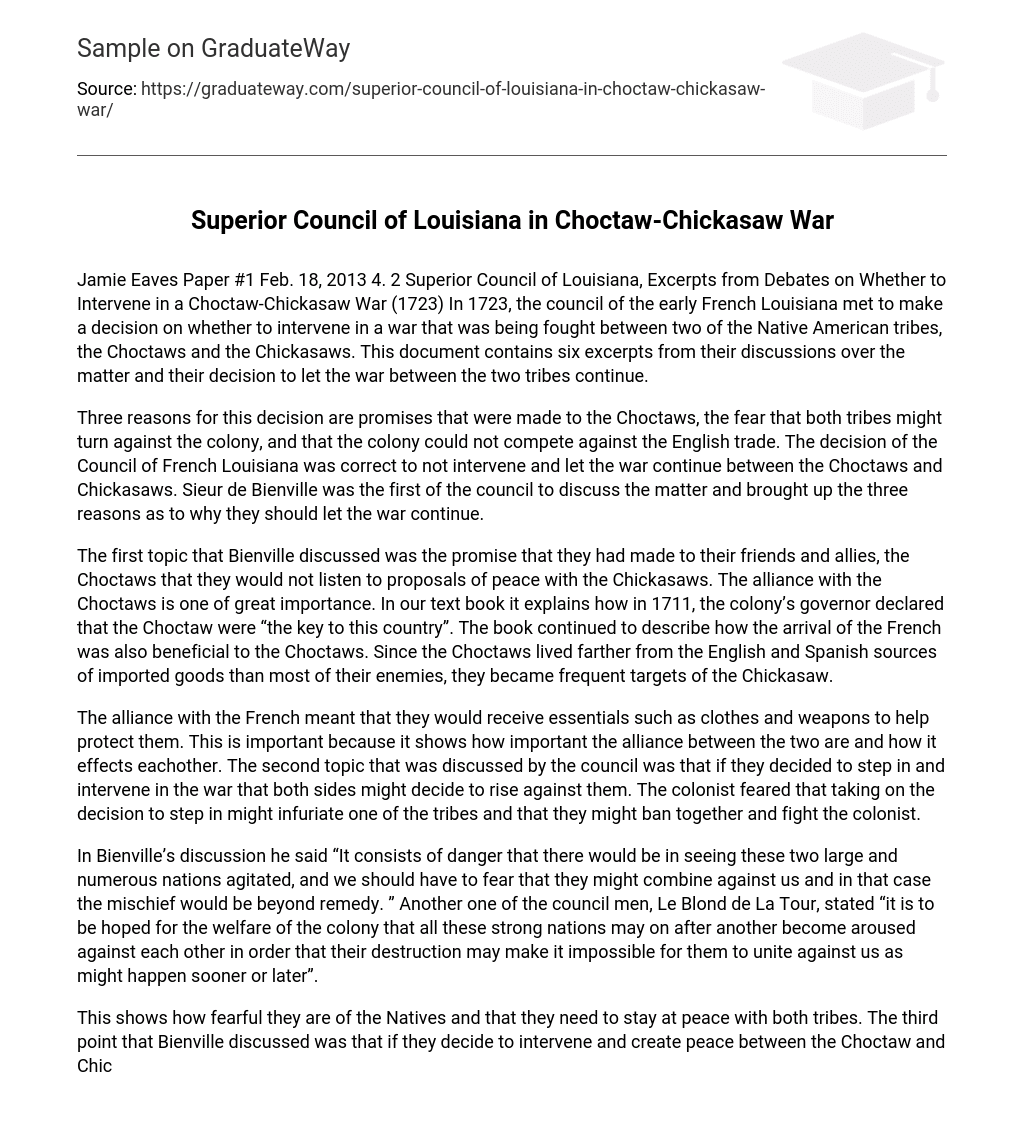The Superior Council of Louisiana, in 1723, convened to deliberate on whether to involve themselves in a conflict between the Choctaw and Chickasaw tribes. The following six excerpts represent their discussions and subsequent decision to allow the war to persist.
The Council of French Louisiana made the correct decision to not intervene in the war between the Choctaws and Chickasaws. Siuer de Bienville, the first to discuss the matter, presented three reasons for this decision. These reasons were the promises made to the Choctaws, the fear of both tribes turning against the colony, and the inability of the colony to compete with English trade.
The first topic Bienville addressed is the promise they made to their friends and allies, the Choctaws, not to consider proposals of peace with the Chickasaws. The alliance with the Choctaws is highly significant. According to our textbook, in 1711, the governor of the colony proclaimed that the Choctaw were crucial to this region. The book further explains how the arrival of the French also benefited the Choctaws. As they resided farther from English and Spanish suppliers of imported goods compared to their adversaries, the Chickasaw frequently targeted them.
The alliance with the French provided the colonists with crucial supplies like clothes and weapons, which were necessary for their protection. This highlights the significance of the alliance and its impact on both parties involved. Additionally, during the council meeting, another topic was raised regarding the potential consequences of intervening in the war. The colonists were concerned that such interference might provoke the anger of one of the tribes, leading them to unite and retaliate against the colonists.
In his discussion, Bienville expressed concern about the potential danger of seeing these two large and numerous nations become agitated. He feared that they might eventually form an alliance against us, and the consequences of such a situation would be beyond repair. Another council member, Le Blond de La Tour, expressed a different perspective. He hoped that all these strong nations would, one by one, become enemies of each other. This way, their destruction would prevent them from ever uniting against us, which could potentially occur in the near or distant future.
This passage demonstrates the fear French settlers have of the Native tribes and highlights the importance of maintaining peaceful relations with both the Choctaw and Chickasaw. Bienville brings up a third point, stating that if they choose to mediate and unite the two tribes, they will have to face competition from English traders. According to Bienville, this would be impossible for the French due to a scarcity of goods and the fact that the English offer better prices for furs.
They acknowledged that they were unable to rival the English trade and proceeded to elaborate on how this could eventually lead to a decline in their business with the Choctaws. Later in the conversation, Bienville clarifies, “This would undoubtedly result in dissatisfaction among these Indians, and we would find ourselves constantly on the brink of conflict, and it is even a concern that if we are unable to establish a small warehouse recommended by the Commissaries to provide the necessary supplies to the Choctaw nation, they may desert us.”
It is crucial for them that they maintain trade deals with the Choctaws since losing these deals could lead to their colony collapsing or being taken over. The Council’s decision to allow the war to persist appeared wise after studying and discussing these topics in class. The survival of the colony heavily relied on the Choctaw tribe, so opposing them could have unfavorable outcomes. Nevertheless, they deliberated on releasing the Chickasaw captives back to the tribe as a means of preserving peace, which was also a prudent decision for the colony.
The text indicates that the colonists support the Chickasaws and do not want to engage in war with them. They may even assist in maintaining civility among the Chickasaws, despite the decision to continue the war. Bienville’s reasons for honoring the promise made to the Choctaws, the fear of both sides turning against them, and the recognition of English trade competition reaffirmed the decision to allow the war to proceed without intervention. This approach proved to be the most beneficial as it kept the colony out of the conflict and maintained a neutral stance with both parties.





